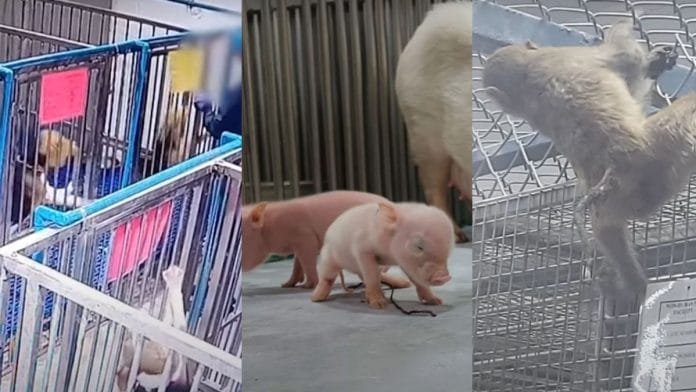New Delhi: A week after Telangana Police booked Palamur Biosciences Private Limited on charges of animal cruelty, a central government-appointed inspection committee Thursday recommended “immediate regulatory action, including the removal and rehabilitation of animals to prevent further pain and suffering” at the firm’s facility, and a review of the its registration and breeding license.
Extensive inspection was conducted earlier this week after the FIR was filed based on the complaint by People for the Ethical Treatment of Animals (PETA) India, which had cited revelations by whistleblowers in a report on 10 June to allege large-scale animal abuse by Palamur.
The organisation had called on the government to take immediate action for violations of CCSEA (Committee for Control and Supervision of Experiments on Animals) norms and unapproved animal testing practices at the Mahabubnagar-based facility. While asserting that such instances were not isolated but reflect a “recurring pattern” in the global animal experimentation industry, PETA had urged the shutdown of the facility, which it dubbed a “house of horrors”, and ending animal testing in India.
According to the inspection committee’s report, Palamur Biosciences uses beagles, pigs, sheep, cattle (including cows), monkeys, rats, mice and rabbits for experiments, although initially denying that some of those species were held by the facility.
“The operational deficiencies observed at Palamur Biosciences are not isolated incidents, but indicative of entrenched structural, procedural and ethical failures,” the inspection committee’s report reads. “The situation demands urgent attention—particularly with respect to the removal and rehabilitation of animals to prevent further pain, distress or suffering.”
What the inspection committee found
The inspectors counted over 1,232 animals in the premises, far beyond the permissible limit by CCSEA. They were found stuffed into repurposed rooms, without health screens or attention to biosecurity. It was also found that the animals are reused in painful experiments, often within weeks, which is a violation of CCSEA guidelines.
A dog died after being made to suffer several tremors in an experiment, the report said. 73 dogs under rehabilitation in a “make-shift arrangement” were kept in the same housing conditions as the dogs used for breeding and experiments. Dogs were found to be kept without bedding or outdoor access, or suitable exercise. In the breeding section, dogs have been forced to live in their filth.
Play area was found to be small with a hard floor and seemed to exist only in name, according to the report. Dogs were also found to be suffering from cherry eye, and were underweight, with no appropriate medical records or evidence of treatments. An animal handler handled a dog roughly before the inspectors. The dogs were also found to be fed once a day.
Cows and minipigs were found in poor body condition. The inspection revealed that minipigs are forced to stand on drainage that traps the feet of cloven-footed animals. Heart-related experiments on White Yorkshire mixed-breed pigs came to light, too. Seven sheep were found at the faculty even as the facility denied harbouring them. Twelve cows were found underweight and without adequate protection.
Narrow metal platforms were found inside the monkey cages. Further, according to the report, the current screening protocol does not check for Kyasanur Forest Disease (KFD), which is transmissible from monkey to monkey, and from monkeys to humans. Sedatives are not used before killing dogs, the investigation revealed, and there is lack of an anxiety, fear and distress management protocol.
Curated CCTV footage was produced for inspectors after repeated requests. It was noted that the overall approach to animal welfare and care at the facility reflected a deeply troubling lack of commitment to the health and well-being of the animals in its custody.
The findings and recommendations have been signed off by Dr Mukesh Kumar Gupta, CCSEA member and director of Indian Council for Medical Research-National Animal Resource Facility for Biomedical Research, Dr Vivek Tyagi, senior consultant at CCSEA, a member of the Animal Welfare Board of India, two nominees of the Institutional Animal Ethics Committee, and the managing director of Humane World for Animals.
PETA India has urged CCSEA to take immediate action based on the report by rescuing and sending all animals to their loving homes and reputable sanctuaries, and revoking Palamur Biosciences’ registration and breeding license.
? BREAKING: Government-Appointed Inspector Report Confirms Animal Abuse at Palamur Biosciences and Recommends Rescue of All 1200+ Animals
An official inspection has confirmed what whistleblowers knew: @PalamurBio is using dogs (beagles), pigs, sheep, cattle (including cows),… pic.twitter.com/dl4JKqi9S2
— PETA India (@PetaIndia) June 26, 2025







PETA is an absolute nuisance for our society and nation.
Why does it not protest when millions of cattle are slaughtered to celebrate Eid?
PETA must be banned and all it’s activists/volunteers arrested and prosecuted.